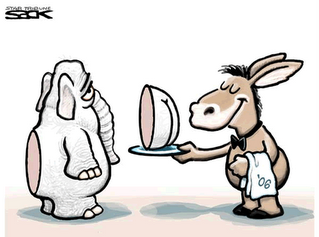What have we won?
 I am one of only a few token Americans at my office. Most of my colleagues consider me more Australian, in fact, but my Yankee twang makes me their go-to guy for questions about the U.S. political ruckus this week. The elections have only just barely breached the limen of French consciousness, but it's a conversation starter. And the French do like to drop by for a chat. One such chat turned into the long-lunch equivalent of a grade-school civics class: how the Congress works, how it gets elected, and what power it has. My French table-mates were hardly put off by the complex of differences between House and Senate, or the idea of mid-term elections. Their legislative system is at least as arcane as America's, and their motivation to understand was spiked by the revelation that the elections would force Bush Jr to eat some humble pie. They were all over that. Sensing I didn't mind that aspect of the outcome, either, they asked if I was happy about the Democratic victory in the House of Representatives. I was guarded. Today, the Senate fell to the Democrats, too. I am more guarded. I am, of course, happy about the forceful rejection of Bush Jr's policies and politics. Having ranted here so often about the damage being done by the Republican dominance of US politics, it would be disingenuous of me to do other than admit a little schadenfreude. As the New York Times editorialized, Tuesday's vote was: ...an angry shout of repudiation of the Bush White House and the abysmal way the Republican majority has run Congress. It was a satisfying expression of the basic democratic principle of accountability. A government that performs badly is supposed to be punished by the electorate. And this government has performed badly on so many counts. Well, Amen to that. The fall of the House and the Senate, and the scapegoating* of Donald Rumsfeld, are all symptoms of the big disease of disillusionment over the Bush Jr worldview, and the Republican leadership's track record. Even if the electorate is prone to see the world your way, it is impossible to continuously claim success while failing to deliver any. You can only be wrong for so long. On Tuesday, Americans simply said "We don't believe you, anymore." (*I use the word "scapegoating" in relation to Rumsfeld advisedly. He is certainly blameworthy for much that has caused great harm, but he did not lose the election for the Republicans. He was only the sub-figurehead of failure in an administration rife with it. His departure is simply a post-election set-piece: meat to appease the howling within his own party, and a bone of tribute to the conquering forces.) I'm also happy about the outcome because I'm a fan of divided government. When parties are forced to share power, more views tend to be heard and considered. Many of the problems of the last 6 years have come to us not because Republicans are bad, but because total dominance by any political party brings out the worst tendencies in the party's dogmatic extremists. Sure, I believe Republicans have shown outrageous cynicism in trying to undermine the courts (activist judges!), the constitution (habeas corpus) and the electoral system (gerrymandering). I'd also like to believe the Democrats would stand above such power-hungry violations of the spirit of democracy. But faith in character and trust in virtue are not enough against the corrupting influence of power. Where politics is concerned, and when stewardship of a great nation is at stake, I'll line my faith and trust up behind structural impediments to imperiousness. The best impediment to the abuse of power, in a democracy, is a countervailing power. With a Republican White House, a Democratic House of Reps, and a Senate that is damn near evenly split, no party is in a position to impose its will. Lastly, I'm happy because I personally line up with the Democrats' policy platform more often than with the Republicans'. I don't follow the Democrats down every path; were I in Congress, my votes would be split between parties, issue by issue. Indeed, I'm more conservative than the neo-cons on a number of hot topics. It's safe to say, however, that I'd be a Democratic-leaning independent. So, "my side" won. The "bad guys" took a beating. Divided government will force some self correction in the system. Why, then, am I not wearing garlands and dancing in the streets? I guess it comes down to this: Seeking a future for America that is better than its present, my eyes are focused on the state of governance of the Republic. How well will the world's only superpower, and its largest economy, be run? By any level-headed estimation, the next two years are going to be hard going: hard governing. The temptation toward vindictive hubris is one danger. It would be completely understandable were the Democrats to take their new seats and wield them like cudgels. They have scores to settle. They could hardly be blamed for wanting to get their own back after being belittled and forcefully shoved aside for six years. A Democratic politics of revenge would, no doubt, feel damn good for a while. But they'd be guaranteeing their failure. To succeed, they need to get things done. Getting things done means finding ways to work with a White House that still has an obstinate neo-con in it. He may be a two-year lame duck, but he can prevent every ambitious Democratic bill from becoming law. Moreover, the fall of the Senate, today, is not without its down-side. Two-house control is dangerous. It could make for calcifying politics if the Democrats get over-confident and act like they hold all the cards. And if there's anything the US needs in the two years between now and 2008 -- the next Presidential election -- it's political de-calcification: a dismantling of the "with-us-or-against-us" politics of the last 12 years, and a search for ways to heal a country that is snarling at itself. The smug post-election gloat of the cartoon above is fine -- maybe even earned -- but we need to move beyond it quickly. The Democrats could also become their own worst enemies. They are not renowned for unity, unlike their opposition. They are not united by a platform or a policy agenda. This election clearly was not about that. As the aforementioned New York Times editorial bluntly put it, "The Democrats won a negative victory, riding on the wave of public anger about Republicans." Vilifying the Republican majority unified Democrats, but that was merely an election strategy. Having won, they have the challenge of forming an agenda and moving it forward. Governing requires working together to find common ground on policies, and carrying that collaboration through the messy process of passing bills into law. The narrowness with which they hold the Senate means that any break at all in Democratic unity will render the party impotent. It is perhaps ironic, then, that it is the very precariousness of that Senate majority that gives me most hope. It is why I am tentatively optimistic. While the Dems have a handy majority in the House of Representatives, they've barely scraped over the line in the Senate. Technically, in fact, they've got the equivalent of a Westminster minority government. The Senate chamber is split evenly between Republicans and Democrats, with 49 seats each. Two independents will caucus with the Dems to tip the balance. So, while Democrats control the machinery, they're going to have to oil the middle to deliver any results. Functionally, the Senate majority won't belong to either party, but will be made up of all the moderates who work across party lines in the center. That could make the divided Senate -- sitting as it does between the hotly Democratic House and the cool Republican president -- a moderating sea between the conflicting climates of two political land masses. All this must happen, however, in spite of every politician having his or her motivations tempted by the spectre of 2008, when the Presidential prize is up for grabs. How much of their energy will they devote to running the country, and how much to positioning themselves for that next pitched battle? That is the single most profound question before the new Congress. That, beyond all else, will determine if anything of importance was really won this week. .. (Hat tip to Neatorama for the cartoon.) |






Comments on "What have we won?"
post a comment